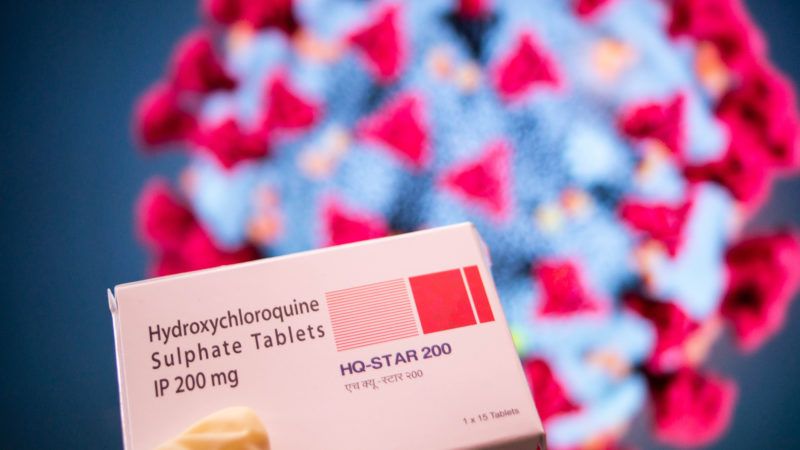Hydroxychloroquine and Chloroquine Increase COVID-19 Patients' Risk of Death, Says New Study
The World Health Organization pauses clinical trials in light of disturbing new results.

"We're going to defeat the invisible enemy. I think we're going to do it even faster than we thought. And it will be a complete victory. It'll be a total victory," declared President Trump at the White House coronavirus task force press briefing on March 18. He hinted that a second news conference in the next day or so would feature "some potentially very exciting news…having to do with the FDA."
A day later the president asserted that the malaria and arthritis drugs chloroquine and hydroxychloroquine had "shown very encouraging—very, very encouraging early results" in treating COVID-19. The president also praised the Food and Drug Administration (FDA) for moving quickly, saying that drugs have "gone through the approval process; it's been approved." Consequently, Trump added, "we're going to be able to make that drug available almost immediately." He suggested that using the drugs to treat patients suffering from COVID-19 could be "a tremendous breakthrough" and "a game changer."
On March 28, the FDA issued an emergency use authorization allowing hydroxychloroquine and chloroquine to be distributed and used to treat certain hospitalized patients with COVID-19. A month later, the agency warned about heart rhythm problems and noted that "hydroxychloroquine and chloroquine have not been shown to be safe and effective for treating or preventing COVID-19." Nevertheless, Trump let slip on May 19 that he was personally taking hydroxychloroquine as a coronavirus preventative treatment. Yesterday, the president said that he has just finished his hydroxychloroquine and zinc treatment regimen.
Sadly, accumulating scientific evidence is ever more strongly indicating that the president's hopes for chloroquine and hydroxychloroquine as breakthrough treatments for COVID-19 are not being borne out.
The latest blow to those hopes was a huge observational study published last Friday by researchers in The Lancet. Researchers assessed nearly 100,000 COVID-19 patients from 671 hospitals on six continents with about two-thirds of the patients hailing from North America. They compared those being treated with chloroquine and hydroxychloroquine alone or in combination with the antibiotics azithromycin or clarithromycin with a cohort of patients who did not take those drugs.
The researchers controlled for multiple confounding factors such as age, sex, race or ethnicity, body-mass index, underlying cardiovascular disease and its risk factors, diabetes, underlying lung disease, smoking, immunosuppressed condition, and baseline disease severity.
Ultimately, they found that for patients treated with hydroxychloroquine, there was a 34 percent increase in risk of death and a 137 percent increase of risk for a serious heart arrhythmia compared to those patients not taking the drugs. The risk of death and heart arrhythmia increased to 45 percent and 411 percent, respectively, for those treated with hydroxychloroquine and an antibiotic. Being treated with chloroquine alone resulted in a 37 percent increased risk of death and a 256 percent increased risk of serious heart arrhythmia. There was also a 37 percent increased risk of death among patients taking both chloroquine and antibiotic. That combination slightly boosted the risk of serious heart arrhythmia to 301 percent.
In the wake of the increased mortality and heart arrhythmia risks reported in The Lancet study, the World Health Organization has decided to pause the ongoing randomized controlled trials using hydroxychloroquine that it is overseeing. Patients in those trials who are currently being treated with the drug will continue to receive it until they have finished their courses of treatment. The agency will evaluate the data so far collected from the trials and plans to issue an evaluation by mid-June of the evidence for harm, benefit, or lack of benefit from using hydroxychloroquine to treat COVID-19.
The best way to nail down the therapeutic risks and benefits of drugs is through randomized double blind placebo controlled clinical trials in which patients are randomly assigned to either the treatment group or the placebo group. Neither the researchers nor the participants know to which group individual patients have been assigned. In mid-May, the National Institute of Allergy and Infectious Diseases announced that it is sponsoring a randomized control trial to evaluate the efficacy of the combination of hydroxychloroquine and azithromycin in treating COVID-19 patients. Preliminary results from that trial are not expected until some time in October. No news yet on whether the agency will continue with the trial in light of The Lancet results.
Perhaps hydroxychloroquine and chloroquine in some combination will still turn out to be a game changer helping to lead to total victory against COVID-19, but that happy outcome is looking ever less likely.
UPDATE: Three of the study's authors retracted it from The Lancet on June 4 because they were unable to complete an independent audit of the data underpinning their analysis and therefore "can no longer vouch for the veracity of the primary data sources." Read more about it here.


Show Comments (163)